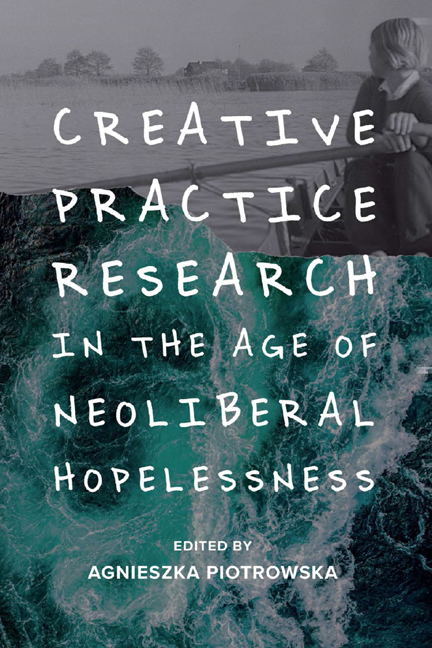Book contents
- Frontmatter
- Contents
- List of Figures
- Notes on Contributors
- Acknowledgements
- Preface: Life in the Post Pandemic Age
- Dedication
- 1 Introduction: Complexities, Compromises and Complicities
- 2 Against the Grain: Women Film Practitioners and Theorists Talk Creative Practice and Theory
- 3 Married to the Eiffel Tower: Notes on Love, Loss and Knowledge
- 4 Creativity and Neoliberalism: Between Autonomy, Resistance and Tactical Compliance
- 5 Tactical Compliance and the Persistence of Elsaesser
- 6 Storytelling and Game Playing
- 7 Autonomy and the Other Woman: Queer Active Agency and Postcolonial Expectations
- 8 From Neolithic to Neoliberal
- 9 First-person Expression on ‘Non-Western’ Screens: China as a Case Study
- 10 Scholarly Exploration of the Creative Process: Integrating Film Theory and Practice
- 11 Teaching Practice as Theory: Guerrilla Filmmaking
- 12 Baits of Falsehood: The Role of Fiction in Documentary or From Untheorised Practice to Unpractised Theory
- 13 Repented: A Creative Intersemiotic Translation
- Notes on Repented
- 14 How do you see me? The Camera as Transitional Object in Diasporic, Domestic Ethnography
- 15 ‘Shut Your Hole, Girlie. Mine's Making Money, Doll’: Creative Practice-Research and the Problem of Professionalism
- 16 Feminist ‘Pensive-creative Praxis’ and Irigaray: A Porous, Dialogical Encounter
- 17 The Paths of Creation, or How Can I Help my Dybbouk to Get Out of Me?
- 18 ‘We Want to Kill Boko Haram’: Reflections on the Photographic Representation of Children in a Displacement Camp
- 19 Between ‘Counter-movement’ (Ingold) and ‘Living with Ghosts’ (Demos)
- 20 Screen Memories: A Video Essay on Smultronstället/Wild Strawberries
- Index
4 - Creativity and Neoliberalism: Between Autonomy, Resistance and Tactical Compliance
Published online by Cambridge University Press: 17 October 2020
- Frontmatter
- Contents
- List of Figures
- Notes on Contributors
- Acknowledgements
- Preface: Life in the Post Pandemic Age
- Dedication
- 1 Introduction: Complexities, Compromises and Complicities
- 2 Against the Grain: Women Film Practitioners and Theorists Talk Creative Practice and Theory
- 3 Married to the Eiffel Tower: Notes on Love, Loss and Knowledge
- 4 Creativity and Neoliberalism: Between Autonomy, Resistance and Tactical Compliance
- 5 Tactical Compliance and the Persistence of Elsaesser
- 6 Storytelling and Game Playing
- 7 Autonomy and the Other Woman: Queer Active Agency and Postcolonial Expectations
- 8 From Neolithic to Neoliberal
- 9 First-person Expression on ‘Non-Western’ Screens: China as a Case Study
- 10 Scholarly Exploration of the Creative Process: Integrating Film Theory and Practice
- 11 Teaching Practice as Theory: Guerrilla Filmmaking
- 12 Baits of Falsehood: The Role of Fiction in Documentary or From Untheorised Practice to Unpractised Theory
- 13 Repented: A Creative Intersemiotic Translation
- Notes on Repented
- 14 How do you see me? The Camera as Transitional Object in Diasporic, Domestic Ethnography
- 15 ‘Shut Your Hole, Girlie. Mine's Making Money, Doll’: Creative Practice-Research and the Problem of Professionalism
- 16 Feminist ‘Pensive-creative Praxis’ and Irigaray: A Porous, Dialogical Encounter
- 17 The Paths of Creation, or How Can I Help my Dybbouk to Get Out of Me?
- 18 ‘We Want to Kill Boko Haram’: Reflections on the Photographic Representation of Children in a Displacement Camp
- 19 Between ‘Counter-movement’ (Ingold) and ‘Living with Ghosts’ (Demos)
- 20 Screen Memories: A Video Essay on Smultronstället/Wild Strawberries
- Index
Summary
My several years researching, writing and directing the documentary essay film The Sun Island have led me to reflect on the connection between my theoretical interests and my practical experience. Involving many moments of doubt, but also of sudden elation and creative energy, the creative process was challenging and, as it turned out, philosophically unsettling.2 I was therefore delighted when asked by Agnieszka Piotrowska to show my film, and was honoured to be one of the keynote speakers at the conference ‘Creative Practice Research in the Age of Neoliberal Hopelessness’ organised by her at the University of Bedfordshire in May 2018. I was also daunted by the task, not least because Agnieszka – in her call for papers – introduced me with a raft of questions she wanted me to address: ‘Elsaesser, after a lifetime of books and papers, has turned his hand to the making of a personal documentary featuring his family's archive. Why did he decide to include practice in his work? What has he learnt that he can share? Can a theorist analyse practice and how?’
In order to respond to at least some of these questions, I decided to divide this account into several parts. First, a few remarks about the external circumstances that brought me to making this film; then some ideas on the topic of creative practice research under neoliberalism, paying due care to the tension that creativity finds itself today not (only) between hope and hopelessness, but also between autonomy (that is, creative independence and authorship) and automation (academic bureaucratic systems on one side, algorithms and search engines automating research on the other). These reflections will bring me back to my practical experience during the years of researching and putting together The Sun Island, which will lead to some concluding remarks that address the question: ‘what has he learnt that he can share?’
EXTERNAL CIRCUMSTANCES AS IMPEDIMENTS OR INCENTIVES?
First, then, the external circumstances that led me to make The Sun Island: perhaps the most banal, but in this academic context not unimportant, circumstance is that my retirement from the University of Amsterdam was mandatory when I turned sixty-five in 2008. As a significant turning point in anyone's life, it proved a useful moment to reflect on both my professional career and my personal life.
- Type
- Chapter
- Information
- Publisher: Edinburgh University PressPrint publication year: 2020



